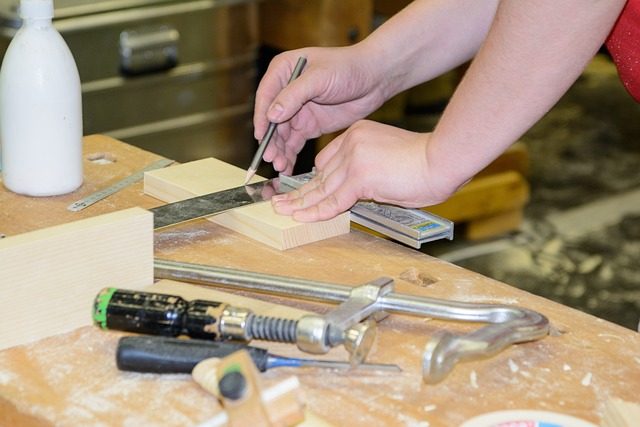The journey to becoming a carpenter is both engaging and rewarding, offering a blend of physical work and creative problem-solving. In this age of digital technology, the timeless craft of carpentry remains a vital component of the construction industry, proving that skills with tools and wood will never go out of fashion.
Whether you’re drawn to the smell of sawdust or the satisfaction of building with your own hands, understanding the steps to become a carpenter is essential. With the right guidance and training, you can transform raw materials into functional and beautiful structures.
Table of Contents
What Is A Carpenter?
Carpentry is a skilled trade that involves the cutting, shaping, and installation of building materials during the construction of buildings, ships, timber bridges, concrete formwork, etc. Carpenters are versatile craftspeople who possess a wide range of capabilities, from framing walls to creating intricate furniture.
Being a carpenter isn’t just about physical strength; it also requires creativity, precision, and an analytical mind. Carpenters must interpret blueprints, adhere to building codes, and ensure structures are built to last. The essence of carpentry lies in transforming blueprints and ideas into tangible realities.
Carpenters play a critical role in the construction industry, often seen as the backbone of building projects. From residential homes to commercial buildings, carpenters bring architects’ visions to life and have a direct impact on the safety and aesthetics of our built environment.
What Skills Do You Need To Become A Carpenter?
Success in carpentry requires a combination of hard skills, such as tool proficiency and technical knowledge, and soft skills, like communication and time management. Attention to detail and problem-solving are paramount, as carpentry work is often complex and multifaceted.
Physical stamina and hand-eye coordination are also essential, as the job can be physically demanding and requires precise movements. Additionally, carpenters must be comfortable working at heights and in various weather conditions.
A good understanding of mathematics is crucial for measurements and calculations. Carpenters must also be adept at using power and hand tools safely and efficiently to cut and shape materials.
What Are The Qualifications Required To Be A Carpenter?
To become a professional carpenter, qualifications can vary. Many carpenters start with a high school diploma and gain experience through apprenticeships or on-the-job training. Some pursue formal education in vocational schools or community colleges that offer carpentry programs.
In many countries, carpenters must hold certifications, such as the Construction Skills Certification Scheme (CSCS) card in the UK. This certification demonstrates a carpenter’s skill level and understanding of safety procedures.
Apprenticeships are highly regarded in the carpentry community, as they combine classroom learning with hands-on experience under the guidance of experienced professionals.
What Does A Carpenter Do On A Daily Basis?
A carpenter’s daily tasks can be diverse, ranging from framing walls and installing cabinetry to crafting furniture or even constructing scaffolds. No two days are alike, as carpenters often move between different job sites and projects.
They must read and interpret blueprints, perform calculations, and select appropriate materials. Carpenters also maintain their tools, ensuring they are sharp and in good working order for precise cuts and safety.
Communication is a key part of the day, as carpenters collaborate with clients, architects, and other tradespeople to ensure projects are completed according to plan.
How Much Can You Earn As A Carpenter?
The earning potential as a carpenter can vary based on experience, location, and whether you are self-employed or work for a company. Entry-level carpenters may start with lower wages, but as they gain experience and possibly specialize in certain areas, their income typically increases.
Some carpenters also take on supervisory roles or start their own businesses, which can significantly increase earning potential. The demand for skilled carpenters often correlates with the health of the construction industry, making it a relatively stable career choice.
Wages can also vary widely depending on the region. For example, carpenters in urban areas or in states like California might earn higher wages due to the cost of living and demand for construction services.
What Is The Career Path And Progression For Carpenters?
The career path for carpenters typically starts with an apprenticeship or entry-level position. As they gain experience, carpenters can move up to journeyman status, taking on more complex projects and greater responsibilities.
With further experience and possibly additional certifications, some carpenters advance to become master carpenters, project managers, or even business owners. Continuous learning and keeping up with industry developments are key to career progression.
Specialization in areas such as cabinetry, finishing, or green building techniques can also provide opportunities for advancement and higher pay.
How To Get Hired As A Carpenter?
Getting hired as a carpenter typically involves showcasing your skills and experience to potential employers. A strong portfolio of past projects, certifications, and a reputation for quality work can set you apart.
Networking in the industry can lead to opportunities, as many jobs are found through word-of-mouth and professional connections. Job seekers should also consider joining trade associations and attending industry events.
An impressive resume that highlights your skills, experience, and any specialties is crucial, as is the ability to perform well in interviews and practical tests.
For those wondering how to become a carpenter with no experience, consider starting with an apprenticeship or a carpentry helper position to learn on the job.
Frequently Asked Questions About Carpentry Careers
How Do I Start a Career as a Carpenter?
Starting a career as a carpenter often begins with a passion for building and hands-on work. Look for apprenticeship programs or entry-level positions to gain practical experience. Vocational schools and community colleges also offer carpentry courses that can jump-start your career.
Remember to also invest in your own set of tools and build a portfolio of your work to show potential employers your skills and dedication to the craft.
Is Becoming a Carpenter Hard?
Becoming a carpenter can be challenging due to the physical demands and the need for precise skills. However, with a strong work ethic, a willingness to learn, and a genuine interest in the craft, many find the challenges of carpentry to be rewarding and well worth the effort.
Also, remember that becoming proficient in any skilled trade takes time and experience, so persistence is key.
Can You Make Good Money as a Carpenter?
Yes, carpenters can make a good living, especially as they gain experience and take on more complex projects or leadership roles. Specializing in a niche area of carpentry or starting your own business can also increase your earnings.
Salaries can vary widely based on location, so researching your local market can give you a better idea of potential earnings.
How Long Does It Take to Learn Basic Carpentry?
Learning the basics of carpentry can take a few months to a couple of years, depending on the training path you choose. Apprenticeships, which combine on-the-job training with classroom instruction, typically last three to four years.
However, even after formal training, carpentry is a lifelong learning process with new techniques and materials constantly emerging.
As part of your learning process, it is helpful to watch experienced carpenters at work. Here’s an informative video that offers insight into the trade:









